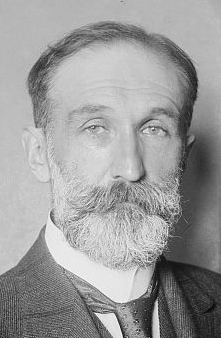هنري رابو
هنري رابو Henri Rabaud (10 نوفمبر 1873 – 11 سبتمبر 1949)، هو مايسترو ومؤلف موسيقي فرنسي، تقلد مناصب بارزة في تأسيس الموسيقى الفرنسية وشجع الاتجاهات الرئيسية المحافظة في الموسيقي الفرنسية في النصف الأول من القرن العشرين.[1][2]
حياته
ولد رابو في عائلة موسيقية. حيث كان ابناً لعازف التشيلو هيپوليت رابو (1839–1900)، أستاذ التشيلو في پاريس، وكانت والدته مغنية ومؤسسة دور مارگريت at the request of Gounod.[2] His maternal grandfather was a well-known flautist,[2] while his great aunt was Julie Dorus-Gras.[1]
درس هنري في كونسرڤاتوار مع أندريه گدالگ وجول ماسنيه. في 1908، أصبح مايسترو في كوميك پاريس، پاريس، حيث قاد العرض ال100 لاوپرا معروف، اسكافي القاهرة، [3] ومن عام 1914 حتى 1918 كان مديراً لدار الاوپرا. عام 1918 أصبح المدير الموسيقي لاوركسترا بوسطن السيمفوني لموسم واحد قبل عودته لباريس. بينما كان في بوسطن، انتخب عضواً في ألف شاپتر أخوية فا مو ألفا سينفونيا، الأخوية الوطنية للرجال في الموسيقى.
في أعقاب استقالة گابريل فوره عام 1922، خلف رابو كمدير للكونسرڤاتوار، حيث شغل المنصب حتى تقاعدة عام 1941. تحت نظام ڤيشي، قام رابو بحماية العديد من الأستاذة اليهود، محاولاً الحصول على استثناءات من لازاره لڤي وأندريه بلوك. However, without prompting from the German authorities he compiled a dossier describing in detail the racial make-up of all Conservatoire students.[4]
مؤلفاته الموسيقية
حصلت مقطوعته الموسيقي "دافنه" على الجائزة الكبرى في روما عام 1894. His comic opera معروف، اسكافي القاهرة combines the Wagnerian and the exotic. He wrote other operas, including L'appel de la mer based on J. M. Synge's Riders to the Sea, as well as incidental music and film scores, such as the 1925 score for Joueur d'échecs (Chess Player).
Orchestral music by Rabaud includes a Divertissement on Russian songs, an Eglogue, a Virgilian poem for orchestra, as well as the symphonic poem La procession nocturne, his best known orchestral work, still occasionally revived and recorded. He also wrote music for chorus and orchestra and two symphonies.
His chamber music includes several works for cello and piano as well as a Solo de concours for clarinet and piano — a virtuosic competition piece written in 1901 for Conservatoire contests.
Conservative as a composer, he was known for his mantra, "modernism is the enemy".
أعمال مختارة
- Procession nocturne, 'Symphonic poem after Nicolas Lenau", 1899
- Divertissement sur des chansons russes, 1899
- Job, oratorio, 1900
- La fille de Roland، اوپرا، 1904
- معروف، اسكافي القاهرة، اوپرا، 1914
- L'appel de la mer، اوپرا، 1924 (based on Riders to the Sea by John Millington Synge)[3]
- Rolande et le mauvais garçon, 1934
- Prélude et Toccata for piano and orchestra
- Eglogue
- Symphony No. 1 in D minor (1893)
- Symphony No. 2 in E minor (1899-1900)
- Solo de Concours pour Clarinet et Piano, Op. 10
- String Quartet, Op. 3
- Andante et Scherzo for flute, violin and piano, Op. 8
- Incidental music for 'The Merchant of Venice', 1917 based on works by William Byrd, Giles Farnaby and others
- Film scores for معجزة الذئاب (1924) وJoueur d'échecs (1926))
انظر أيضاً
- معجزة الذئاب (فيلم 1924)
المصادر
- ^ أ ب Girardot A. Henri Rabaud. In: The New Grove Dictionary of Opera. Macmillan, London and New York, 1997.
- ^ أ ب ت Landormy P. La Musique Française après Debussy. Gallimard, Paris, 1943.
- ^ أ ب Wolff S. Un demi-siècle d'Opéra-Comique (1900-1950). André Bonne, Paris, 1953.
- ^ Jean Gribenski, in Myriam Chimènes (ed.) : La vie musicale sous Vichy, Paris, 2001, p147.
